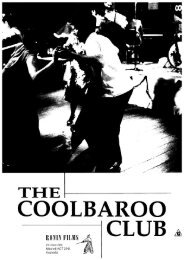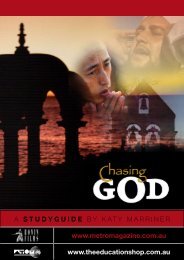THE SHORT SYNOPSIS - Ronin Films
THE SHORT SYNOPSIS - Ronin Films
THE SHORT SYNOPSIS - Ronin Films
Create successful ePaper yourself
Turn your PDF publications into a flip-book with our unique Google optimized e-Paper software.
<strong>THE</strong> <strong>SHORT</strong> <strong>SYNOPSIS</strong><br />
‘Facing the Demons’ is the story of a journey to bring the family and friends<br />
of a murdered boy together in one room with those convicted of his killing.<br />
On one fateful night in 1994, a murder opened up a huge well of unresolved<br />
pain, guilt, anger, confusion and frustration. The murdered boy, it soon became<br />
clear, was not the only victim of this crime.<br />
In this heart rending story we meet a cast of wonderful characters. On the<br />
victim’s side are the mother and the father, as well as friends and co-workers.<br />
On the other are two of the four convicted of the murder.<br />
And in the middle, the man determined to bring them altogether is Senior<br />
Sergeant Terry O’Connell of the New South Wales Police Service.<br />
The confrontation between them offers an opportunity for all those traumatised<br />
by the event to hear, for the first time ever, the other’s side of the story. Talking<br />
directly to each other they have a chance to vent built up emotions, to find<br />
answers to unresolved questions and perhaps find a way to move ahead in lives<br />
which have been indelibly affected by a horrific and senseless crime.<br />
© The Dee Cameron Company – 9 April 1999 1
<strong>SYNOPSIS</strong><br />
In 1994 four young men attempted an armed hold-up in a suburban Sydney<br />
Pizza Hut. But it ended in disaster. While trying to warn his colleagues about the<br />
robbery, an 18 year old university student, a part-time pizza delivery boy,<br />
Michael Marslew, was shot in the back of the head at point blank range.<br />
Six months later four young men were arrested and convicted of his murder.<br />
They have already served nearly five years of sentences ranging from 8 to18<br />
years.<br />
The events of that one fateful night have left countless lives in tatters. For all<br />
those associated with the murder, life took a turn for the worse – a path from<br />
which none could ever turn.With the pulling of the trigger of a sawn-off<br />
shotgun, a huge well of unresolved pain, guilt, anger, confusion and frustration<br />
was opened up. The murdered boy, it soon became clear, was not the only<br />
victim in this crime.<br />
Over a six week period we document first hand the process of creating an<br />
extraordinary event. For the first time anywhere in the world, those responsible<br />
and convicted of a murder are brought together in one room to face the<br />
toughest jury they ever have to meet: the family and friends of their victim.<br />
At the centre of our story are four main characters: an ordinary Australian cop,<br />
Senior Sergeant Terry O’Connell of the NSW Police Service, the instigator and<br />
facilitator of the conference; the murdered boy’s father, Ken Marslew; the<br />
murdered boys mother, Joan Griffiths and Karl Kramer, one of the four convicted<br />
of the murder. It is the intersection of their stories, revolving around the<br />
conference, which give the film extraordinary drama.<br />
The journey for Terry O’Connell to make the conference happen is full of<br />
unforeseen hurdles. Although he is well versed in pulling such conferences<br />
together, brokering this one proves more challenging than any he has<br />
attempted before.<br />
Ken Marslew, a self-styled advocate for victims of crime, is constantly bringing<br />
his son’s murder into the public consciousness, with his privately run antiviolence<br />
organisation called ‘Enough is Enough’. It is Marslew’s high profile<br />
which creates problems for O’Connell as he tries to navigate the highly charged<br />
emotions surrounding this particular case.<br />
Marslew’s profile also creates problems for his ex-wife Joan, mother of the<br />
murdered boy. As Ken Marslew took ownership of Michael’s murder in the<br />
media and his mind, Joan feels she has been ignored as the mother.<br />
© The Dee Cameron Company – 9 April 1999 2
BA CKGROUND TO <strong>THE</strong> RESTORATIVE JUSTICE<br />
CONFERENCE PROCESS<br />
The ‘conference’ process was developed by Senior Sergeant Terry O’Connell<br />
ten years ago in the NSW country town of Wagga Wagga.<br />
Confronted by an ever growing number of juvenile offenders, O’Connell sought<br />
an alternative to courts and incarceration. By adopting the idea of a ‘shaming<br />
ceremony’ as used historically in indigenous cultures, O’Connell hit on what he<br />
believes is the creation of an effective alternative – the creation of<br />
a ‘safe’ environment in which offenders can be directly confronted with the<br />
harm they have caused to the victims.<br />
Bringing victims and offenders together in a forum which allows them to<br />
express their emotions, validates the victim’s feelings and encourages offenders<br />
to accept responsibility for their actions. Ultimately, it aims to repair some of the<br />
harm, and return balance and hope to lives shattered by serious crime.<br />
O’Connell’s devotees are spread far and wide: The Royal Canadian Mounted<br />
Police, the Canadian Department of Justice, the Anoka Police force in Minnesota,<br />
USA, and Chief Constable Charles Pollard of the Thames Valley Police Service in<br />
the UK.<br />
Within the NSW Police Service, his attempts to affect behavioural change starts<br />
within his own very entrenched Police culture, which tends to view him as a<br />
troublemaker.<br />
© The Dee Cameron Company – 9 April 1999 3
WHAT IS RESTORATIVE JUSTICE? – Quotes from the<br />
academics<br />
“My experience is that the offender more fully recognises and understands<br />
exactly what they have done, and generally their victims are happier because<br />
they have had their chance to have their say, and play their part in the justice<br />
system.”<br />
Professor John Braithwaite – ANU Social Sciences<br />
“Conferencing is about re-creating community. One that is critical to assist us<br />
make sense of a world that has experienced significant social change over the<br />
past 40 years. They have the potential to contribute significantly – towards<br />
minimizing the harm experienced in our formal criminal justice systems…”<br />
Snr Sgt Terry O’Connell<br />
“Conference participants are connected at a common level of humanity because<br />
emotions are a shared human experience.”<br />
Snr Sgt Terry O’Connell<br />
“I don’t want to leave the impression that this process is a magic wand. That it<br />
suddenly fixes everything. It doesn’t, but it can be a pivotal step in the grieving<br />
process; in the process of letting go; in the process of moving on with life…”<br />
Dr. Mark Umbreit, Professor of Social Work, University of Minnesota<br />
“The people in the front line are the offenders whose behaviour has harmed;<br />
the parents who are desperate for solutions to their child’s outrageous<br />
behaviour; the old folks who are frightened; the victims of crime who don’t<br />
understand why it happened and wait for the next time; the siblings who don’t<br />
understand the behaviour of their brother or sister … those with the knotted<br />
stomachs who are separating; the numb babies whose world’s are falling apart;<br />
the grandparents whose mantelpiece photographs bear witness to what they<br />
spent their lives hoping for, now in tatters.”<br />
Graham Chaseling, ‘Conferencing’, UWS Liverpool, 1997<br />
© The Dee Cameron Company – 9 April 1999 4
DIRECTORS ST ATEMENT – ‘Facing the Demons ’<br />
I’ve always been intrigued by stories about people who are driven; they’ve<br />
always interested me. In many ways it is obvious – people who are driven, who<br />
have a passion, a strong belief in something, are usually good subject-matter for<br />
films.<br />
And that applies here. Both Terry O’Connell and Ken Marslew are driven men<br />
with their own particular barrows to push. Both want to change a criminal<br />
justice system which they believe doesn’t work. O’Connell is a NSW Senior<br />
Police Sergeant, Marslew, a self-styled advocate against crime.<br />
The story takes the form of a journey undertaken by Terry O’Connell to make a<br />
conference happen – to bring those convicted of a murder, face-to-face with the<br />
family and friends of their victim, Ken Marslew’s 18 year old son, Michael.<br />
My interest in the story was not just that there were good characters to carry us<br />
through, but because it is about something which really matters. It is a story full<br />
of emotion, heart-rending in many ways. Those who finally became involved<br />
were prepared to put their trust not only in the conference process, but also in<br />
the making of the film.Along the way we learn of the difficulties and the<br />
heartaches of those contemplating the conference process. I wanted to allow<br />
the viewer to share their visions, their passions, their pain and their anger.<br />
As documentary filmmakers we are privileged to be given entry into the world<br />
of other people. I was delighted to have the opportunity to tell this particular<br />
story.<br />
The film is straight-forward in its filmic style, the emphasis being on the<br />
characters and their stories. It is an emotional, strong, people-based story. It is a<br />
story of how a senseless, horrific event forever affected the lives of dozens of<br />
ordinary suburban people.<br />
Aviva Ziegler<br />
Director<br />
© The Dee Cameron Company – 9 April 1999 5
PROJECT B ACKGROUND<br />
Anyone who’s ever produced a social issue documentary knows it is one<br />
long, intense journey involving many people. When you add to that mix the<br />
elements of a bereaved family, a murder case, an estranged father and mother, a<br />
maverick cop, and a collection of bureaucracies, some would say it’s a recipe for<br />
insanity.<br />
‘Facing the Demons’ was born out of sheer determination to get this story told.<br />
This determination started for me five years before, ironically around the same<br />
time of Michael Marslew’s murder, when I met a senior grief counsellor at our<br />
city morgue working to form a victims support group for homicide. Through my<br />
association with these people I came to realise that victims and offenders think<br />
about one another all the time. They sometimes invade one another’s lives, often<br />
harmfully and mostly negatively. There seemed to be a lot of damaged people<br />
with many misgivings about our current system of criminal justice. It was<br />
through this victims movement that I had met Ken Marslew in the making of an<br />
earlier non-broadcast documentary.<br />
This program was a collaboration with some very generous people. It earned us<br />
all some international acclaim. I suppose I earned my stripes in making this<br />
documentary without sensationalising anyone’s pain.<br />
I had already met Ken Marslew, the social change activist, and sooner or later I<br />
suppose I was destined to meet Terry O’Connell. Together with my friend and<br />
right hand researcher, Michael Dye, we stumbled across the concept of<br />
Restorative Justice Conferencing, and once again Terry O’Connell’s name<br />
appeared.<br />
As they say, the rest is history. And there began a journey that would take us on<br />
a 12 month collision course of trying to get a film up, and attempting to<br />
persuade many bureaucracies that we had credibility and a modicum of<br />
integrity. In addition, we had to work out a way to explain the complexity of<br />
issues around the painful facts of a murder and everyone it involves.<br />
I can say we have never lost sight of the fact that we are dealing with people’s<br />
lives. As many agreements, promises, and assurances that I have had to give – I<br />
have to say I have been given trust, care, disclosure as I have never experienced<br />
ever before. The amount of human kindness and generosity, against a backdrop<br />
of acute pain, upset and hopelessness, has made this a maiden voyage I will<br />
never forget.<br />
Dee Cameron<br />
Producer<br />
© The Dee Cameron Company – 9 April 1999 6
<strong>THE</strong> CAST<br />
The Murder Victim – Michael Marslew,18 year old, fun loving, sensitive,<br />
thoughtful university student and part-time worker at the Jannali Pizza Hut –<br />
shot in the back of the head at point blank range in an attempted armed<br />
robbery.<br />
The Uniformed Cop – Terry O’Connell, with 28 years in the NSW Police<br />
Service, would like to change our criminal justice system which he believes<br />
doesn’t work. Senior Sergeant O’Connell heads the Restorative Justice Unit of<br />
the NSW Police Service. He is both conference instigator and facilitator in our<br />
story.<br />
The Born Again Political Activist – Ken Marslew, father of the murder<br />
victim, driven by anger about his son’s senseless murder. With many years of<br />
selling expertise, has founded his own privately run charitable organisation<br />
‘Enough is Enough’.<br />
Ken sees only black or white, but presents a picture with shades of grey. Torn<br />
between his public ‘crime fighting’ persona and the grief ridden father of the<br />
murdered boy, Ken is a complex character. He causes no end of trouble for<br />
O’Connell as he tries to pull the conference together.<br />
The Mother – Joan Griffiths, mother of the murder victim, is a warm, friendly,<br />
woman who five years down the tack, still has a huge daily struggle to deal<br />
with the death of her son. Her pain is reinforced by the public role her ex-<br />
husband has adopted. She feels, as the murdered boy’s mother, that she has<br />
been forgotten.<br />
The Offenders – Karl Kramer, 28 years old and the armed robbery<br />
mastermind, is a huge surprise. With a gift for words and a moral bent, he<br />
doesn’t fit the stereo type of a convicted killer. Into his fifth year of a 15 year<br />
sentence, he has given plenty of thought to his crime.<br />
The Offenders – Douglas Edwards, the driver of the getaway car. The<br />
adopted child of a respectable family who are mortified by his actions. He will<br />
be the first to be released.<br />
© The Dee Cameron Company – 9 April 1999 7
MINOR CHARACTERS<br />
The second wife – Lynette Marslew, small, quiet, determined, savvy wife and<br />
right-hand support of Ken Marslew.<br />
The murder victim’s co-workers from the Pizza Hut – Lisa, Caroline and<br />
Mikel, have never been able to get over experiencing Michael’s death at such<br />
close quarters. All three talk about it like touching an open wound.<br />
The murder victim’s friends – Sara and Brendon, both grew up with<br />
Michael and still suffer greatly from the loss of their best friend.<br />
Douglas’ Edwards mother – Joanne Edwards, represents the pain suffered<br />
by the offender’s families. She was desperate to apologise to Michael’s parents<br />
for her son’s actions.<br />
© The Dee Cameron Company – 9 April 1999 8
<strong>THE</strong> PRODUCTION TEAM<br />
Writer/Director: Aviva Ziegler<br />
Aviva has worked in Australian television for over 25 years. She began her<br />
career with the Australian Broadcasting Corporation in the trail-blazing social<br />
issues documentary program,‘Chequerboard’.<br />
Her Willesee documentary ‘Quentin’, was the highest rating documentary ever<br />
seen on Australian television and won a logie for ‘Best Documentary’. Her<br />
personal film ‘What Is A Jew To You?’ has screened broadly and won numerous<br />
prizes throughout the world.<br />
As an independent filmmaker, Aviva has been involved in many highly acclaimed,<br />
prize-winning documentaries and series both in Australia and abroad.<br />
Her most recent director credits were for ‘Zoo Company’, an eight part half hour<br />
series for the ABC and Canal Plus in France and ‘Casino’, a half hour documentary<br />
in the six-part Film Australia series ‘The Gamblers’ screened on the ABC.<br />
Aviva continues to work as an independent director producer.<br />
© The Dee Cameron Company – 9 April 1999 9
Producer: Dee Cameron<br />
Dee Cameron is a producer in a variety of media and with a twenty year<br />
career in corporate communications, she has learned the disciplines of film-<br />
making, video, audio visual, theatrical event production and management.<br />
She has run her own production company for ten years, has run other people’s<br />
production companies from time-to-time, and has freelanced successfully in<br />
between. These days she chooses to work as an independent producer, forming<br />
project teams with other like-minded independents.<br />
Her work includes most of the major Australian corporations who work in the<br />
corporate communication and business theatre arenas. She has worked in all<br />
major Australian capitals, and extensively throughout Hong Kong, Malaysia,<br />
China and Japan.<br />
‘Facing the Demons’ is Dee’s first foray into producing a documentary film for<br />
broadcast and follows a community service program made for the Homicide<br />
Victims Support Group, ‘Living Beyond Murder’. ‘Facing the Demons’ has evolved<br />
into a labour of love, absorbing over a year of her time and resources. The<br />
driving force has always been a fascination with the principles of restorative<br />
justice conferencing, and a belief that this program may make a difference.<br />
© The Dee Cameron Company – 9 April 1999 10
Director of Photography: Tony Wilson ACS<br />
Tony has worked as a D.O.P. on documentaries and features, shooting in<br />
locations as diverse as Senegal, Surabaya and Western Samoa. He has been<br />
nominated twice for AFI Best Cinematography Awards, and has worked for a<br />
variety of networks: the ABC, SBS, Networks 7, 9 and 10, the BBC, Channel 4,<br />
HBO and Discovery Channel. He has worked on high-profile projects such as:<br />
‘Demons at Drive Time’ (1995),‘Rats in the Ranks’ (1994) and ‘Brothers and<br />
Sisters’ (1997).<br />
Tony worked in his preferred medium of mini-DV and DVC Pro for ‘Facing the<br />
Demons’.<br />
Editor: Andrew Arestides<br />
Andrew has been in demand as an Editor for years, working consistently for<br />
the ABC, SBS and World Vision. He has gained an enviable reputation for editing<br />
social documentaries, given his patience, sensitivity and vision.<br />
His more recent work includes: ‘Thought it was Love…’ for ABC/Living Pictures<br />
(1998); ‘Brothers & Sisters’ for the ABC/Sonja Armstrong Productions (1997);<br />
‘You Always Hurt The Ones You Love’ for the ABC/Living Pictures (1997) and<br />
Gold Mobie winner:‘Two Below Zero’ for Triptych Productions (1996).<br />
© The Dee Cameron Company – 9 April 1999 11
Sound Recordist: Leo Sullivan<br />
Leo has a wealth of experience in drama including,‘Dating the Enemy’<br />
(1995),‘The Sum of Us’ (1993) and 1988’s ‘Sweetie’. His documentary<br />
experience includes ‘Bastards from the Bush’ (1998),‘The Edge of the World’<br />
(1997) and ‘An Imaginary Life’ with David Malouf (1996).<br />
Composer: Jan Preston<br />
Jan has worked as a freelance composer and singer/songwriter for the past<br />
25 years. She has composed music for eight feature films and scores of<br />
documentaries.<br />
Two recent projects include Tom Zubrycki’s ‘Billal’, and Don Featherstone’s film<br />
on David Malouf, ‘An Imaginary Life’, for which she won the AGSC Award for<br />
Best Music for a documentary in 1997.<br />
She continues to record and perform her own compositions, teaches piano and<br />
singing, and is a founding Committee member of the Australian Guild of Screen<br />
Composers.<br />
© The Dee Cameron Company – 9 April 1999 12
OPENING CREDITS<br />
AUSTRALIAN FILM FINANCE CORPORATION PRESENTS<br />
A DEE CAMERON COMPANY PRODUCTION<br />
CLOSING CREDITS<br />
In Memory of Michael Kenneth Marslew<br />
and all those whose lives have been affected by murder<br />
Written and Directed By<br />
AVIVA ZIEGLER<br />
Original Concept By<br />
DEE CAMERON<br />
Director of Photography<br />
TONY WILSON<br />
Editor<br />
ANDREW ARESTIDES<br />
Sound Recordist<br />
LEO SULLIVAN<br />
Composer<br />
JAN PRESTON<br />
Produced by<br />
DEE CAMERON<br />
Produced in Association with the<br />
AUSTRALIAN FILM FINANCE CORPORATION LIMITED<br />
© The Dee Cameron Company – 9 April 1999 13
CAST<br />
Senior Sergeant Terry O’Connell<br />
Ken & Lynette Marslew<br />
Joan & Terry Griffiths<br />
Lisa Titcume, Mikel Priest & Caroline Judd<br />
Sarah Anderson<br />
Brendon Dorff<br />
Joanne & Douglas Edwards<br />
Karl Kramer<br />
Mularwee High School – Goulburn<br />
Jannali Probus Club<br />
Hamish – the dog<br />
Associate Producer MICHAEL DYE<br />
Production Manager SUE CLOTHIER<br />
Researcher MICHAEL DYE<br />
Consultant ROBYN HUGHES<br />
Production Accountant JANINE ALEXANDER MONEYPENNY SERVICES<br />
Additional Camera PRESTON CLOTHIER, PHILLP BULL,<br />
RAY HENMAN<br />
Additional Sound Recordists GRANT ROBERTS, ANDY POSTLE,<br />
MAX HENSER, MARTIN HARRINGTON,<br />
ANTONY KOVEOS<br />
Camera Assistant MICHAEL LYNCH<br />
Stills Photography KRISTY O’BRYAN<br />
Sound Engineer ALASDAIR MACfARLANE<br />
Offline Editing <strong>THE</strong> BONDI EDIT COMPANY<br />
Online Editing <strong>THE</strong> BONDI EDIT COMPANY<br />
Grading ROEN DAVIS – VISUALEYES<br />
Completion Guarantee ROB FISHER – FACB<br />
Legals BRETT OATEN, GABBY STEIN<br />
© The Dee Cameron Company – 9 April 1999 14
Interview Transcriptions KERRIE MCGOVAN, PAT FISKE,<br />
ROCHELLE BOGLE<br />
Publicity TRACEY MAIR PUBLICITY<br />
Press Kit Design TMP WORLDWIDE<br />
With special thanks to other participants:<br />
Kirstie, Melissa, Samantha & Matthew<br />
Vic Bailey – Salvation Army<br />
Roger Blake – Junee Prison Psychologist<br />
Inmates at Junee Prison<br />
ARCHIVAL/LIBRARY FOOTAGE SOURCES<br />
Channel 10 Library<br />
Channel 7 Library<br />
Personal Photographs from The Marslew & The Griffiths Families<br />
Brendon Dorff & Melanie<br />
‘AMAZING GRACE’<br />
Composed by John Newton<br />
Performed by the family & friends at Michael Marslew’s Funeral<br />
Used by kind permission of Channel 10 Library<br />
‘IF YOU AIN’T GOT <strong>THE</strong> SWING’<br />
Composed by Glenn Miller<br />
Performed by The Jannali High School Band<br />
With many thanks for their support, and guidance:<br />
Terry O’Connell, Jim Ritchie, Paul Herring, Matt Casey & Peta Blood<br />
Restorative Justice Group of The New South Wales Police Service<br />
Christine Nixon – Assistant Commissioner<br />
Sutherland Police, NSW Police Service Ballistics, Hurstville Crime Scene Unit<br />
John Merrick – Senior Grief Counsellor NSW Forensic Medicine<br />
Bob Debus – Corrective Services Minister, Jennifer Mason – Chief of Staff<br />
Corrective Services Media, PR Kerry Mumford, Bob Stapleton<br />
Michael Vita – Corrective Services Operations<br />
Governors of Long Bay, Junee & Bathurst Prisons<br />
Professor John Braithwaite – ANU School of Social Sciences<br />
© The Dee Cameron Company – 9 April 1999 15
With special thanks:<br />
Dasha Ross & Sue Bennett – ABC-TV Documentaries<br />
Susan MacKinnon & Nadine Richardson – Australian Film Finance Corporation<br />
Jeremy Bean – Australian Film Commission<br />
With grateful acknowledgement for the formative stages:<br />
Scott & Grant Higgins<br />
Daryl Karp<br />
Simon von Wolkenstein & Peta Lee<br />
Preston & Sue Clothier<br />
Rob MacDonald<br />
Ken Marslew & Terry O’Connell<br />
Cameron Craig, Jamie Carroll, Tim Brooke-Hunt, Tracey Mair, Mandy Groom<br />
Franco Di Chiera, Patrick Power QC DPP, Chris Maxwell QC<br />
All our family and friends who’ve listened so patiently for so long about our<br />
obsession called ‘Facing the Demons’<br />
© The Dee Cameron Company – 9 April 1999 16
This film was produced with the financial assistance of the<br />
Australian Film Commission<br />
Produced With The Assistance of The<br />
AUSTRALIAN BROADCASTING CORPORATION<br />
Executive Producer, Dasha Ross<br />
© 1999 Australian Film Finance Corporation Limited and<br />
The Dee Cameron Company<br />
FINANCED BY <strong>THE</strong><br />
AUSTRALIAN FILM FINANCE CORPORATION LIMITED<br />
© The Dee Cameron Company – 9 April 1999 17
A WORLD TELEVISION FIRST<br />
T WO CONVICTED CRIMINALS COME<br />
FAC E - TO - FACE WITH <strong>THE</strong> TOUGHEST JURY<br />
OF A L L :<strong>THE</strong> FA M I LY AND FRIENDS<br />
OF <strong>THE</strong>IR MURDERED V I C T I M<br />
WHY WOULD OFFENDERS TAKE PART?<br />
WHY WOULD <strong>THE</strong> VICTIM’S FA M I LY ?<br />
WHAT’S IN IT FOR ANY OF <strong>THE</strong>M?<br />
W H AT DO <strong>THE</strong>Y HAVE TO GAIN?<br />
PRESS KIT<br />
9 April 1999<br />
©<br />
The Dee Cameron Company<br />
The contents of this document are Confidential, and are not to be copied or published<br />
without the express written permission of the holders of the copyright.


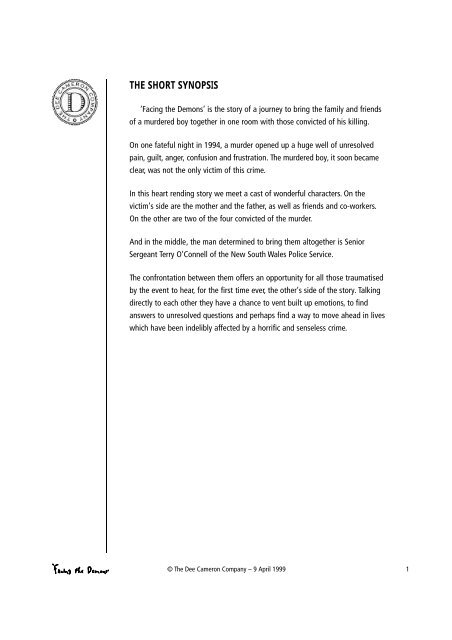
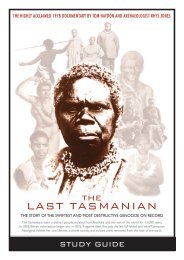
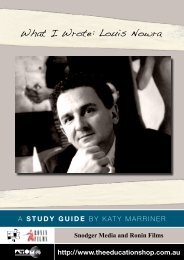
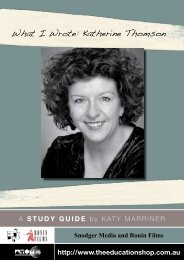
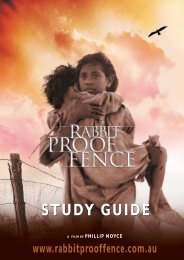
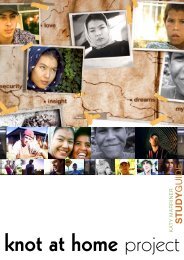
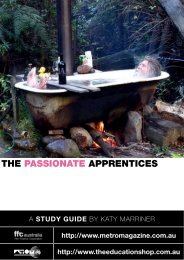
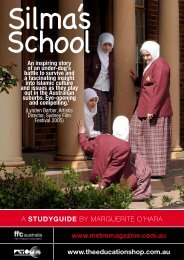
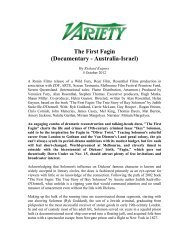
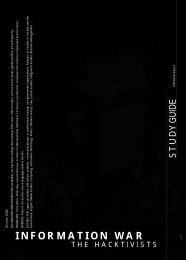
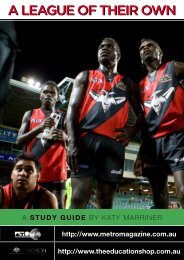
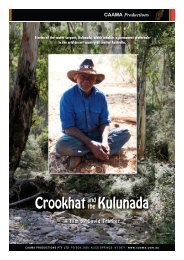
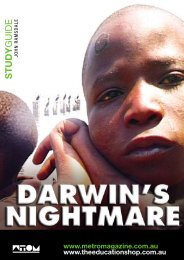
![to download FROHE OSTERN! [HAPPY EASTER!] - Ronin Films](https://img.yumpu.com/33740736/1/184x260/to-download-frohe-ostern-happy-easter-ronin-films.jpg?quality=85)
